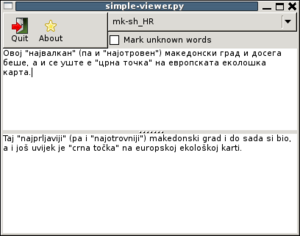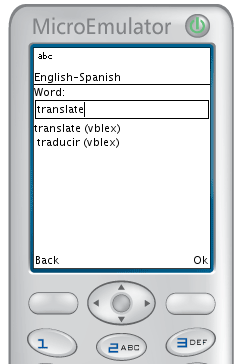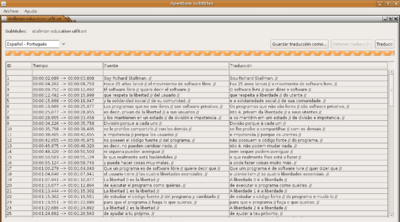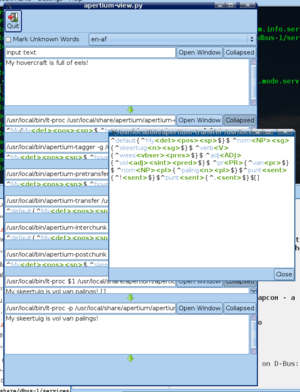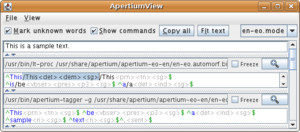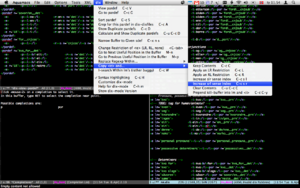Difference between revisions of "Tools"
Jump to navigation
Jump to search
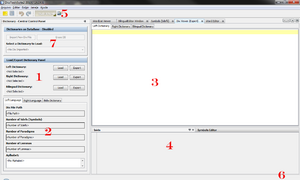
(New page: * Apertium-view - a little GUI application that allows you to view and edit the output of every phase in a translation. * Apertium-tolk - a simple cousin of Apertium-view. It...) |
|||
| (31 intermediate revisions by 8 users not shown) | |||
| Line 1: | Line 1: | ||
[[Outils|En français]] |
|||
{{Main page header}} |
|||
==Tools for users / translators== |
|||
* [[Apertium Simpleton UI]] is a simple UI for Windows or Mac OS X that lets you easily install and translate text |
|||
[[Image:Screenshot_apertium-tolk.png|thumb|300px|right|[[Apertium-tolk]]]] |
|||
| ⚫ | |||
[[Image:Apertium-tinylex-emu.png|thumb|300px|right|Apertium TinyLex Emulation]] |
|||
* [[Apertium-tinylex|Apertium TinyLex for J2ME]] is a Java 2 Micro Edition program for mobile devices which looks up dictionary entries. |
|||
* [[Tinylex on a Palm|Apertium TinyLex for Palm]]. Mobile dictionaries for Palm can be generated using the dix2tiny task in apertium-dixtools package. |
|||
[[Image:Apertium-subtitles-800px.png|thumb|400px|right|Apertium Subtitles: Translation Form]] |
|||
*[[Apertium Subtitles]] is a program which can be used to translate subtitles. |
|||
*[[Tradubi]] is a web-based post-editing and dictionary customisation environment for users who wish to customise their MT system. |
|||
* [[Gedit]] is a plain text/code editor that has an [https://git.gnome.org/browse/gedit-plugins/tree/plugins/translate apertium translation plugin] |
|||
=== Screenshots === |
|||
<gallery> |
|||
Image:Screenshot_apertium-tolk.png|[[Apertium-tolk]] |
|||
Image:Apertium-tinylex-emu.png|[[Apertium-tinylex]] for J2ME |
|||
Image:Palm-os-emulator.png|[[Tinylex on a Palm|Apertium TinyLex for Palm]] |
|||
Image:Apertium-subtitles-800px.png|[[Apertium Subtitles]]: Translation Form |
|||
</gallery> |
|||
==Tools for developers== |
|||
*[[D-Bus service for Apertium]] (also see [[D-Bus examples|our D-Bus examples]]!) |
|||
[[Image:Apertium-view-screenshot-1.png|thumb|300px|right|[[Apertium-view]]]] |
|||
* [[Apertium-view]] - a little GUI application that allows you to view and edit the output of every phase in a translation. |
* [[Apertium-view]] - a little GUI application that allows you to view and edit the output of every phase in a translation. |
||
[[Image:Screenshot-jApertiumView-3.png|thumb|300px|right|[[Apertium-viewer]]]] |
|||
| ⚫ | |||
* [[Apertium-viewer]] is a version of Apertium-view with more features, it does not require d-bus and is written in Java |
|||
[[Image:EasyFigure1.png|thumb|300px|right|The main window of [[Easy dictionary maintenance|DicsToolsSuite]]]] |
|||
* [[Easy dictionary maintenance|DicsToolsSuite]] is a Java GUI tool (under development) to make dix editing simple and friendly for non-programmers |
|||
[[Image:dix.el.png|thumb|300px|right|Screenshot of dix.el in Aquamacs (fullscreen). Upper left window has output from dix-view-pardef, lower left shows rng schema completion. There is a red underline since a <code>p</code> can't be an empty element, as noted by the message in the minibuffer]] |
|||
* [[Emacs|dix-mode]] is an extension for Emacs that gives some handy features for dix/XML editing, e.g. goto/view-pardef, cycle restrictions with Ctrl+Tab, keyboard shortcuts to move to the next Interesting element, etc. |
|||
=== Screenshots === |
|||
<gallery> |
|||
Image:Apertium-view-screenshot-1.png|[[Apertium-view]] |
|||
Image:Screenshot-jApertiumView-3.png|[[Apertium-viewer]] |
|||
Image:dix.el.png|[[dix-mode]] |
|||
Image:EasyFigure1.png|[[Easy dictionary maintenance|DicsToolsSuite]] |
|||
</gallery> |
|||
== Other software == |
|||
Beyond using Apertium behind a graphic interface, several codebases exist which deliver Apertium as a service. These can be used, for example, to serve webpages within a website. See [[Apertium services]]. |
|||
Plugins have been developed for other projects. For example, see the IRC client plugins [[Plugin for XChat]] and [[Plugin for Pidgin]]. |
|||
For more applications of Apertium, browse the category link below. |
|||
==See also== |
|||
* More tools in the [http://wiki.apertium.org/wiki/Category:Tools category page], especially [http://wiki.apertium.org/wiki/Category:User_interfaces User interfaces] |
|||
[[Category:Tools|*]] |
|||
[[Category:Documentation in English]] |
|||
Latest revision as of 07:17, 4 September 2017
|
Installation • Resources • Contact • Documentation • Development • Tools |
Contents
Tools for users / translators[edit]
- Apertium Simpleton UI is a simple UI for Windows or Mac OS X that lets you easily install and translate text
- Apertium-tolk - a simple cousin of Apertium-view. Its emphasis is on user friendliness. It shows the output of a translation as you type.
- Apertium TinyLex for J2ME is a Java 2 Micro Edition program for mobile devices which looks up dictionary entries.
- Apertium TinyLex for Palm. Mobile dictionaries for Palm can be generated using the dix2tiny task in apertium-dixtools package.
- Apertium Subtitles is a program which can be used to translate subtitles.
- Tradubi is a web-based post-editing and dictionary customisation environment for users who wish to customise their MT system.
- Gedit is a plain text/code editor that has an apertium translation plugin
Screenshots[edit]
Apertium-tinylex for J2ME
Apertium Subtitles: Translation Form
Tools for developers[edit]
- D-Bus service for Apertium (also see our D-Bus examples!)
- Apertium-view - a little GUI application that allows you to view and edit the output of every phase in a translation.
- Apertium-viewer is a version of Apertium-view with more features, it does not require d-bus and is written in Java

The main window of DicsToolsSuite
- DicsToolsSuite is a Java GUI tool (under development) to make dix editing simple and friendly for non-programmers
- dix-mode is an extension for Emacs that gives some handy features for dix/XML editing, e.g. goto/view-pardef, cycle restrictions with Ctrl+Tab, keyboard shortcuts to move to the next Interesting element, etc.
Screenshots[edit]
Other software[edit]
Beyond using Apertium behind a graphic interface, several codebases exist which deliver Apertium as a service. These can be used, for example, to serve webpages within a website. See Apertium services.
Plugins have been developed for other projects. For example, see the IRC client plugins Plugin for XChat and Plugin for Pidgin.
For more applications of Apertium, browse the category link below.
See also[edit]
- More tools in the category page, especially User interfaces
